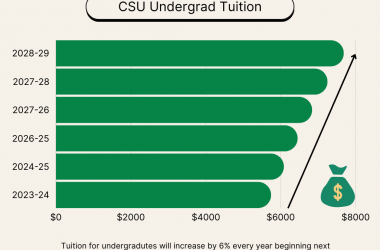Two months after students approved a $16 Associated Students Inc. fee increase, the ASI Senate approved a 2014-15 operating budget Wednesday that would increase executive’s salaries by 33 percent, according to ASI Executive Director Richard Haller.
Haller said the current elected executives, which include the ASI president, vice president and treasurer, earn $16,752 annually. Under the proposed part-time executive payroll budget increase, the incoming executives would earn an annual salary of $22,392 for 2014-15.
He said appointed positions, such as the chief of staff and chief programming officer who earn $14,157 annually, are also included in the part-time executive payroll budget. Under the proposed increase, the position holders would earn $19,032 annually.
ASI President John Haberstroh said that in addition to receiving an annual salary, the three elected ASI officers, who also serve as board members of the 49er shops, are given up to $300 per month for meals and their tuition is waived by the Office of the President.
The proposed salary increase, which would raise executive salaries for the first time since 2007-08, sparked a lengthy discussion among Senate members at recent Senate meetings.
College of Liberal Arts Senator James Dinwiddie, who proposed three amendments that would have allocated a portion of the salary increase to student scholarships, travel expenses and research grants, said an increase of that amount was not necessary.
“I drafted the amendments simply because I felt that between the waived tuition, 49er benefits and their ASI pay the executives make more than enough in compensation for their part time job,” Dinwiddie said.
Although some senators agreed with Dinwiddie’s concerns, all three amendments either didn’t pass or were dropped.
“My main point since the beginning has been stressing that if any or all three of the amendments were to pass, it would not be cutting their salary,” he said. “[The amendments] would just simply increase their salaries by a lesser amount.”
ASI Treasurer Agatha Gucyski, who is in favor of the increase, said that serving as an executive officer is more than simply having a part-time job.
“In reality, we are executive officers of a nonprofit corporation,” Gucyski said. “We are in charge of so much and the pay does not match the workload or the skillset needed to fulfill the job.”
Some students, like senior accounting major Rich Banh, said ASI should have disclosed more information about wage increases while advocating for the $16 ASI fee increase.
“I was okay with the fee referendum that came up because I need the 24-hour study center but ASI should have talked more about the salary when they were promoting the referendum,” Banh said.
Other students, like sophomore computer engineering technology major Zach Kao, said they felt a little deceived by ASI.
“It’s not right that they didn’t publicize the salary and wage increase as much as they advertised major programs and events,” he said. “Students deserve to know everything the fees they’re paying goes to.
However, Haberstroh said that they executives were unaware that the part-time executive payroll budget would be increased when advocating for the $16 ASI fee increase in February. Haberstroh added that the increase to the executive budget is only “a fraction” of the $1.1 million being generated by the ASI fee referendum.
“Some people are saying we just had the fee referendum but we’re spending all this money on pay raises, but the fee increase raised a lot more revenue than $20,000,” he said. “I don’t think it’s as big of a deal as people want to make it out to be.”
Current Chief of Staff and incoming ASI President Joseph Phillips is well aware that the ASI salary is a “point of contention,” but ultimately, he said, the current pay is “unreasonable.”
“We are a multi-million dollar nonprofit corporation that is student-run, and that also doubles as a student government,” he said. “ We work much more than our required hours and the job extends far beyond what is on the simple job description.”
Phillips said that although the executives are supposed to work 25 hours per week, they often dedicate more time serving on committees such as the ASI Board of Control.
Haller said this is the first increase to executive salaries since 2007-08 because of financial circumstances that included a decrease in enrollment and cuts in state funding for the university.
“The executives at that time agreed to just maintain their pay at what it had been in the prior year,” Haller said. “That just kept going on and on and on, because we didn’t really have the money to follow what the policy told us to do.”
Gucyski said that the current salary has been in violation of the policy on executive fellowship, which says the officers must be paid in accordance with the cost of living.
“It’s incredible how much we are underpaid,” she said. “People can argue that we get paid a lot compare to other Cal State Universities, but the circumstances are different at every school.”
Haller noted that ASI executives are prohibited from holding outside employment or having any additional jobs while in office.
“This really is their only source of income unless they’ve got financial support from family,” Haller said.
After receiving approval from the ASI BOC and Senate, the 2014-15 ASI consolidated operating budget is now sitting on Interim President Donald Para’s desk awaiting approval before the ASI fiscal year ends on June 30, Haller said.
Para will ultimately have the authority to revise the budget, but Haller said it is unlikely for the budget to be unapproved.
“In all the years I’ve been here, the president has never revised or not approved the budget,” Haller said. “So I can say it’s pretty safe that that’s the budget that we’ll be working with for next year.”
Managing Editor Courtney Tompkins contributed to this report.



